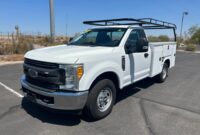3/4 And 1 Ton Trucks For Sale: Your Comprehensive Buying Guide sale.truckstrend.com
When the job demands more than just a typical pickup, 3/4-ton and 1-ton trucks step up to the plate. These formidable machines, often referred to as heavy-duty or Super Duty trucks, are purpose-built for serious towing, hauling, and rigorous work. Far beyond the capabilities of their half-ton counterparts, these trucks are the backbone of many businesses, recreational pursuits, and demanding personal projects. For contractors moving heavy equipment, farmers transporting livestock, RV enthusiasts towing large fifth-wheel trailers, or anyone needing unparalleled strength and durability, understanding the nuances of 3/4-ton and 1-ton trucks is crucial for making an informed purchase. This comprehensive guide will navigate you through everything you need to know when looking for these powerhouses for sale.
Understanding 3/4-Ton and 1-Ton Trucks
3/4 And 1 Ton Trucks For Sale: Your Comprehensive Buying Guide
The terms "3/4-ton" and "1-ton" originated from the approximate payload capacity these trucks could handle in their early days (1,500 lbs and 2,000 lbs, respectively). While modern trucks vastly exceed these numbers, the nomenclature persists. Today, these classifications primarily refer to a truck’s Gross Vehicle Weight Rating (GVWR), which is the maximum permissible weight of the vehicle itself, plus its passengers, cargo, and any accessories.
- 3/4-Ton Trucks (e.g., Ford F-250, Ram 2500, Chevrolet Silverado 2500HD, GMC Sierra 2500HD): These trucks typically have a GVWR ranging from 8,500 to 10,000 pounds. They offer significantly higher payload and towing capacities than half-ton trucks, featuring stronger frames, heavier-duty suspension components, larger brakes, and more robust powertrains, often with powerful gasoline V8s or optional diesel engines. They strike a balance between immense capability and relative daily drivability.
- 1-Ton Trucks (e.g., Ford F-350, Ram 3500, Chevrolet Silverado 3500HD, GMC Sierra 3500HD): Stepping up from 3/4-ton, 1-ton trucks boast even higher GVWRs, generally ranging from 10,000 to 14,000 pounds or more. They are designed for the heaviest loads, frequently featuring dual rear wheels (dually) for enhanced stability and towing capacity, especially for gooseneck and fifth-wheel trailers. They share many components with their 3/4-ton siblings but are further reinforced for maximum performance.
Both categories are characterized by their heavy-duty construction, designed to withstand continuous strenuous work that would quickly wear out lighter vehicles.
Key Benefits of Owning a 3/4-Ton or 1-Ton Truck
The advantages of investing in a heavy-duty truck are clear for those with demanding needs:

- Superior Towing Capacity: This is arguably the primary reason most buyers choose these trucks. They can comfortably tow large travel trailers, fifth-wheel RVs, multi-horse trailers, car haulers, and heavy construction equipment, often exceeding 20,000 pounds with the right configuration.
- High Payload Capacity: Whether it’s a bed full of gravel, a heavy truck camper, or specialized tools, these trucks are built to carry substantial weight without straining or compromising safety.
- Durability and Longevity: Constructed with tougher components, heavy-duty trucks are designed for a longer working life under strenuous conditions, making them a wise long-term investment.
- Enhanced Stability and Control: Their robust chassis, heavy-duty suspension, and wider stance (especially dually models) provide superior stability and control, particularly when towing or hauling heavy loads, contributing to a safer driving experience.
- Versatility: While often seen as workhorses, modern heavy-duty trucks can also serve as comfortable daily drivers, offering luxurious interiors and advanced technology in higher trim levels.
- Strong Resale Value: Due to their specialized capabilities and robust construction, 3/4-ton and 1-ton trucks tend to hold their value well, commanding strong prices in the used market.

Important Considerations When Buying
Purchasing a heavy-duty truck involves several critical decisions to ensure you get the right vehicle for your specific needs.

- New vs. Used:
- New: Offers the latest technology, full warranty, and customization options. However, they come with a higher price tag and immediate depreciation.
- Used: Can provide significant savings and bypass the steepest depreciation. The trade-off is potential wear and tear, limited warranty (if any), and possibly outdated technology. A thorough pre-purchase inspection is paramount for used trucks.
- Engine Options (Gas vs. Diesel):
- Gasoline Engines: Generally less expensive to purchase and maintain. They offer good power for occasional heavy towing and are often preferred for shorter trips or lighter loads due to quicker warm-up times.
- Diesel Engines: Known for their immense torque, superior fuel economy (especially when towing), and incredible longevity. They excel at sustained heavy towing but come with a higher upfront cost, more expensive maintenance, and sometimes higher fuel costs (though better MPG often offsets this).
- Drivetrain (2WD vs. 4WD):
- 2WD (Two-Wheel Drive): Typically more fuel-efficient, less expensive, and has a slightly higher payload/towing capacity due to less weight. Ideal if you operate primarily on paved roads.
- 4WD (Four-Wheel Drive): Essential for off-road use, snowy/icy conditions, or pulling heavy loads on slippery surfaces (e.g., boat ramps, muddy job sites). Adds complexity, weight, and cost.
- Cab Configurations:
- Regular Cab: Two doors, single row of seating. Best for work-only applications where maximum bed length and minimal passenger space are desired.
- Extended/Quad Cab: Smaller rear doors, limited rear seating. Offers some versatility for occasional passengers or secure storage.
- Crew Cab: Four full-size doors, spacious rear seating. Ideal for families, work crews, or those needing ample interior space.
- Bed Lengths:
- Short Bed: Easier to maneuver, but limits cargo volume.
- Standard Bed: A good compromise for most uses.
- Long Bed: Maximizes cargo capacity, essential for certain fifth-wheel hitches or large items. Impacts maneuverability.
- Trim Levels and Features: Heavy-duty trucks range from basic work-truck trims to luxurious, technology-packed models. Balance your budget with desired comfort, convenience, and safety features.
- GVWR, Payload, and Towing Capacity: Always consult the truck’s specific ratings (often found on a sticker in the door jamb or owner’s manual) to ensure it meets or exceeds your maximum anticipated needs. Do not rely solely on manufacturer brochures, as capacities vary by configuration.
Where to Find 3/4-Ton and 1-Ton Trucks For Sale
The market for heavy-duty trucks is robust, offering several avenues for purchase:
- Dealerships (New and Used): Authorized brand dealerships (Ford, Ram, Chevrolet, GMC) are the primary source for new trucks and often have a strong selection of certified pre-owned (CPO) and used heavy-duty models. Benefits include financing options, warranties, and trade-in services.
- Online Marketplaces: Websites like AutoTrader, Cars.com, CarGurus, and eBay Motors allow you to browse a vast inventory from both dealerships and private sellers across the country, making it easy to compare models, prices, and features.
- Private Sellers: Websites like Craigslist, Facebook Marketplace, and local classifieds can offer competitive prices, as there are no dealer markups. However, purchases are typically "as-is," with no warranty, requiring extra diligence on your part for inspection and vehicle history.
- Auctions: Government, fleet, and salvage auctions can be sources for heavily discounted trucks, but they often come with higher risks, as vehicles may require significant repairs or have incomplete histories.
- Specialized Commercial Truck Dealers: Some dealerships focus specifically on heavy-duty and commercial vehicles, offering a wide selection and specialized knowledge.
Tips for a Successful Purchase
- Define Your Needs Clearly: Before you even start looking, accurately determine your maximum towing and payload requirements. Will you be towing a 15,000-lb RV or hauling 3,000 lbs of lumber? This dictates the minimum capacity you need.
- Set a Realistic Budget: Beyond the purchase price, factor in insurance, fuel costs (especially for diesel), and higher maintenance expenses for heavy-duty components.
- Research Thoroughly: Compare models from different manufacturers. Read reviews, watch video comparisons, and understand common issues or strengths of specific year models and powertrains.
- Inspect Rigorously (Especially Used): For used trucks, a pre-purchase inspection (PPI) by a qualified, independent mechanic specializing in heavy-duty vehicles is non-negotiable. Check for rust, frame damage, leaks, transmission issues, and proper functioning of all systems.
- Test Drive Extensively: Drive the truck on various road types, including highways and possibly with a load if feasible (though often not practical for a test drive). Listen for unusual noises, assess braking, acceleration, and handling.
- Obtain a Vehicle History Report: Services like CARFAX or AutoCheck provide valuable insights into a truck’s past, including accident history, service records, odometer discrepancies, and previous ownership.
- Negotiate Wisely: Be prepared to negotiate the price, especially for used trucks. Research comparable sales in your area to establish a fair market value.
- Understand Financing and Insurance: Explore your financing options beforehand and get insurance quotes, as premiums for heavy-duty trucks can be higher.
Potential Challenges and Solutions
While heavy-duty trucks offer immense benefits, they also come with certain considerations:
- High Initial Cost:
- Solution: Consider well-maintained used models, explore different financing options, and be prepared to negotiate. Buying a few years old can save tens of thousands.
- Fuel Economy:
- Solution: Diesel engines generally offer better fuel economy, especially when towing, though diesel fuel can be more expensive. For those not constantly towing, a gas engine might be a more economical choice overall. Drive conservatively.
- Maneuverability and Parking:
- Solution: These trucks are large. Practice driving, utilize parking sensors and rearview cameras, and consider a shorter bed/cab configuration if maximum capacity isn’t always needed.
- Maintenance Complexity and Cost:
- Solution: Heavy-duty components are more robust but can be more expensive to repair or replace. Adhere strictly to the maintenance schedule, find a reputable heavy-duty mechanic, and budget for potential higher service costs.
- Insurance Costs:
- Solution: Shop around for quotes from multiple insurance providers. Your intended use (personal vs. commercial) can also impact rates.
Price Table: Estimated Costs for 3/4-Ton and 1-Ton Trucks
The price of a 3/4-ton or 1-ton truck varies significantly based on make, model, year, mileage, condition, engine type, drivetrain, cab configuration, bed length, and trim level. The table below provides estimated ranges to give you a general idea. These are subject to market fluctuations and specific vehicle conditions.
| Make/Model | Year Range | Configuration (Example) | Engine Type | Est. Used Price Range | Est. New Price Range (MSRP) |
|---|---|---|---|---|---|
| 3/4-Ton Trucks | |||||
| Ford F-250 Super Duty | 2017-2023 | Crew Cab, 4×4, Lariat | 6.7L Power Stroke Diesel | $40,000 – $75,000+ | $65,000 – $95,000+ |
| 2017-2023 | Crew Cab, 4×4, XLT | 7.3L Gas V8 | $35,000 – $60,000 | $55,000 – $80,000 | |
| Ram 2500 Heavy Duty | 2017-2023 | Crew Cab, 4×4, Laramie | 6.7L Cummins Diesel | $45,000 – $78,000+ | $68,000 – $98,000+ |
| 2017-2023 | Crew Cab, 4×4, Tradesman | 6.4L Gas V8 | $30,000 – $55,000 | $50,000 – $75,000 | |
| Chevy Silverado 2500HD | 2017-2023 | Crew Cab, 4×4, LTZ | 6.6L Duramax Diesel | $42,000 – $76,000+ | $67,000 – $97,000+ |
| 2017-2023 | Crew Cab, 4×4, WT | 6.6L Gas V8 | $32,000 – $58,000 | $52,000 – $78,000 | |
| GMC Sierra 2500HD | 2017-2023 | Crew Cab, 4×4, Denali | 6.6L Duramax Diesel | $48,000 – $80,000+ | $75,000 – $100,000+ |
| 1-Ton Trucks | |||||
| Ford F-350 Super Duty | 2017-2023 | Crew Cab, Dually, 4×4, King Ranch | 6.7L Power Stroke Diesel | $50,000 – $85,000+ | $75,000 – $110,000+ |
| Ram 3500 Heavy Duty | 2017-2023 | Crew Cab, Dually, 4×4, Limited | 6.7L Cummins Diesel HO | $52,000 – $88,000+ | $78,000 – $115,000+ |
| Chevy Silverado 3500HD | 2017-2023 | Crew Cab, Dually, 4×4, High Country | 6.6L Duramax Diesel | $50,000 – $87,000+ | $78,000 – $112,000+ |
Note: "HO" for High Output diesel engines offers even more power and torque, typically found in higher trims of 1-ton trucks.
Frequently Asked Questions (FAQ)
Q: What is the main difference between a 3/4-ton and a 1-ton truck?
A: The primary difference lies in their GVWR, which directly impacts their payload and towing capacities. 1-ton trucks are built with stronger components (e.g., thicker frames, heavier axles, more robust suspension) to handle significantly more weight, and often come with dual rear wheels (dually) for enhanced stability when towing very heavy loads.
Q: Do I really need a diesel engine?
A: It depends on your primary use. If you plan to tow heavy loads (over 10,000-12,000 lbs) frequently or for long distances, a diesel engine’s superior torque, longevity, and better fuel economy while towing make it the ideal choice. For occasional, lighter towing or daily driving, a modern gasoline V8 might be more cost-effective due to lower purchase price and maintenance.
Q: How do I find the specific towing and payload capacity for a truck?
A: Always check the specific truck’s door jamb sticker (often on the driver’s side) and the owner’s manual. These sources provide the most accurate GVWR, GCWR (Gross Combined Weight Rating), payload capacity, and maximum towing capacity for that exact configuration. Online resources or brochures provide general figures, but the sticker is gospel for that particular vehicle.
Q: Are 3/4-ton and 1-ton trucks good for daily driving?
A: They can be, especially in higher trim levels that offer comfortable interiors and advanced features. However, they are larger, less fuel-efficient, and harder to maneuver and park in urban environments compared to half-ton trucks or SUVs. Their ride quality is also generally stiffer when unloaded due to their heavy-duty suspension.
Q: What does "dually" mean?
A: "Dually" refers to a truck with dual rear wheels on each side, totaling four wheels on the rear axle. This configuration is almost exclusively found on 1-ton trucks (and larger commercial trucks) to provide increased stability, traction, and weight distribution for maximum payload and towing capacities, especially for large fifth-wheel or gooseneck trailers.
Q: What do GVWR, GCWR, Payload, and Towing Capacity mean?
A:
- GVWR (Gross Vehicle Weight Rating): The maximum permissible weight of the fully loaded vehicle, including the vehicle itself, fuel, passengers, and cargo.
- GCWR (Gross Combined Weight Rating): The maximum permissible weight of the loaded truck AND its attached trailer, including all cargo, passengers, and fuel in both.
- Payload Capacity: The maximum weight a truck can carry in its cab and bed, including passengers, cargo, and any accessories. Calculated as GVWR minus the truck’s curb weight.
- Towing Capacity: The maximum weight a truck can pull on a trailer. This is a complex calculation that considers the truck’s GCWR, curb weight, and payload.
Conclusion
The market for 3/4-ton and 1-ton trucks for sale is vibrant, reflecting the enduring demand for these highly capable vehicles. Whether you’re a seasoned professional needing a reliable workhorse or a passionate RVer embarking on cross-country adventures, these heavy-duty pickups offer the power, durability, and capacity to get the job done. By thoroughly understanding your specific needs, diligently researching available options, and conducting meticulous inspections, you can confidently navigate the buying process. A well-chosen 3/4-ton or 1-ton truck isn’t just a vehicle; it’s an invaluable tool and a long-term investment that will empower you to tackle the toughest tasks with ease and confidence.




